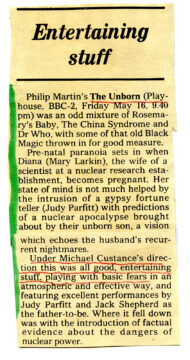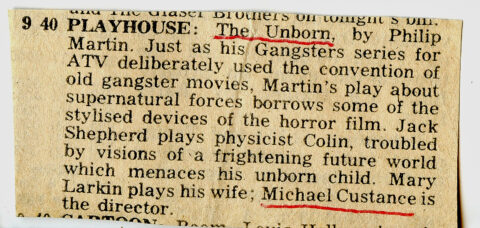
Here is the script front page from ‘Telly Addicts’ series 13, eps 13/14. It lists the key staff member in each department. The popular television game show was presented by Noel Edmonds.

Here is the script front page from ‘Telly Addicts’ series 13, eps 13/14. It lists the key staff member in each department. The popular television game show was presented by Noel Edmonds.

Commemorative BBC envelope to celebrate the 10 year anniversary of the BBC Pebble Mill broadcast centre, which Colin Bailey sent to himself.
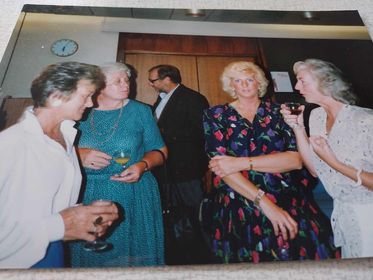
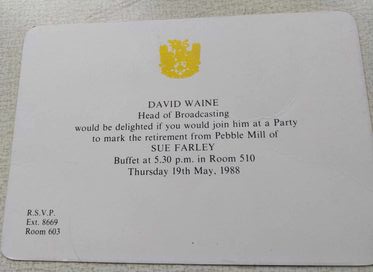
Thanks to thanks to Sarah Tongue, Carole Howell’s daughter, for sharing this photo of, and invitation to, Sue Farley’s retirement party in 1988.
Beryl Thompson (left), Myles Lang (centre), Barbara Wrigley (right in black patterned dress), Margaret Barton (right).
Sue Farley was PA on the Farming programme, as well as in the Asian Programmes Unit and John King’s unit.
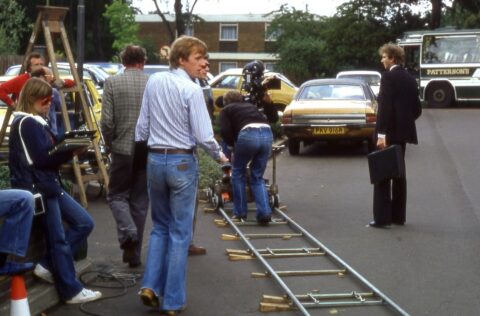
‘Keep Smiling’, photo by James French
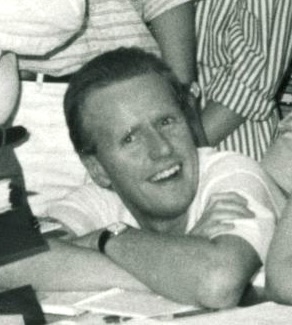
From Heather Storr, Diana Coxon and Jenny Brewer
It is with great sadness that we pass on the news of the death of David Attwood. David had not been well for the last few years and he died on 21st March 2024. Many of you will remember him from his days in English Regions Drama at Pebble Mill.
Here are some memories from both Heather and Diana. This list of shows that David worked on is not exhaustive but is truly representative of his skills and expertise as a Director.
David joined the Drama Department as an AFM in 1976. He came down from BBC Scotland where he had worked with Alastair Reid. Heather worked with him on OUR FLESH AND BLOOD in 1976 and the next year they both worked on the GANGSTERS series.
A few years later he became a Production Assistant and then Production Manager and worked on OUT OF TOWN BOYS (1978) and KEEP SMILING (1979) before THE BLACK STUFF (1980) and THE MUSCLE MARKET (1981). Then the series BOYS FROM THE BLACK STUFF (1982) and we think DEAD HEAD (1986) as well.
In 1984 he undertook the BBC Directors course and started what was to be his main career as a Drama Director at Pebble Mill. His shows included ALL TOGETHER NOW (1986), a comedy set around a brass band; AIRBASE (1988) which aroused controversy for its unflattering portrayal of life on an American airbase in Britain; and by the time he became freelance KILLING TIME (1990) a dark tale of a killer who befriends a teenager and murders him.
Heather worked with him on the following films between 1992 and 2007.
WILD WEST (1992), SHOT THROUGH THE HEART (1998), SUMMER IN THE SUBURBS (2000), FIDEL (2002), STUART A LIFE BACKWARDS (2007)
His other films/dramas during this time are:
THE FORTUNES AND MISFORTUNES OF MOLL FLANDERS (1996) THE HOUND OF THE BASKERVILLES (2002) MAY 33RD (2004) TO THE ENDS OF THE EARTH (2005) BLOOD AND OIL (2010)
HIs nominations and awards include :
TO THE ENDS OF THE EARTH
BAFTA Awards / 2006 Nominee / Best Drama Serial
Biarritz International Festival of Audiovisual Programming / 2006 Nominee / TV Series and Serials
SHOT THROUGH THE HEART
San Francisco International Film Festival / 1999 Winner / Television Drama Feature
BLOOD AND OIL
Geneva International Fim Festival / 2009 Winner / Drama Series

